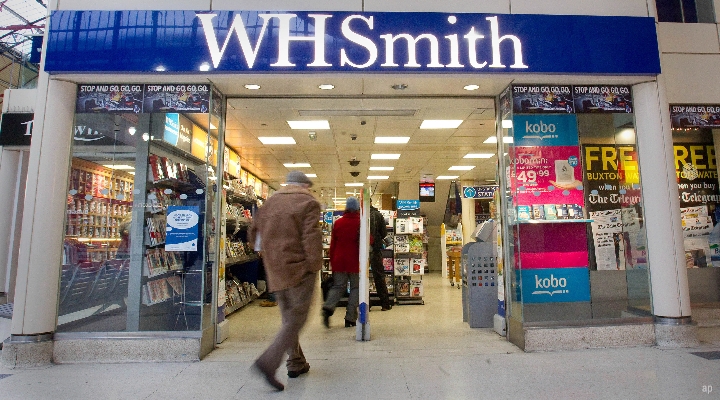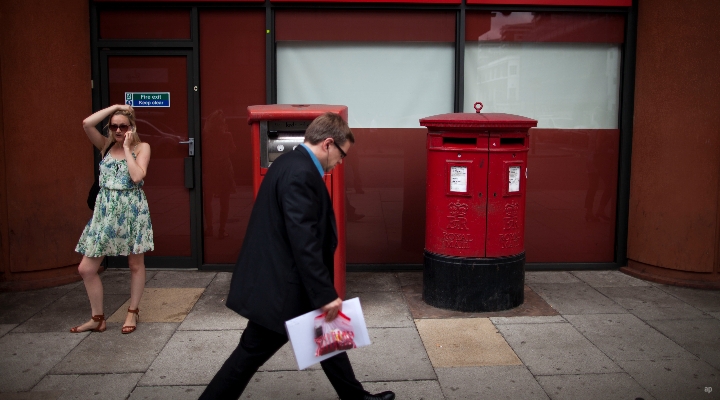
WH Smith Has Been Targeted
WH Smith is the latest company to be hit by a cyberattack. The retailer said hackers accessed data on current and former workers, including NI numbers, although customer accounts remained safe. This follows a wave of similar attacks in recent months, with both the Post Office and JD Sports being high profile targets. It's been a bad few years for WH Smith. It has faced criticism from some customers for its attempts to "upsell" oversized chocolate bars at its checkouts, not to mention the Twitter feed chronicoling its “messy” shop floors. More seriously, it was voted the UK’s worst retailer in 2019 – for the second year running – and last year was hit was a massive shareholder rebellion, with more than half of its investors failing to support plans to pay the CEO a bonus worth £550,000. This latest problem may mean largesse is on hold for another year. Magazine anyone?
Revolut Got There Eventually
Digital bank Revolut has been hailed as a fintech star in the UK, growing rapidly since its launch in 2015. But there has been a five-month delay on the publication of its accounts, after auditors raised concerns about its IT systems. The bank, which has more than 27 million customers, offers currency exchange, cryptocurrency trading and bank accounts in Europe via its Lithuanian banking licence. These accounts, finally published this week, showed BDO was concerned Revolut’s IT systems were “not designed in such a way that would allow for IT or business process controls to be effectively tested throughout the year.” Revolut’s management says this simply reflects the firm’s stellar expansion, and the fact its IT systems weren’t initially scaled for that level of growth. It added it wasn’t expecting similar problems ahead – and the belated publication of its accounts meant it was one step closer to getting a UK banking licence.
M&G’s May be Turning a New Leaf
Australian investment bank Macquarie is considering a £5 billion takeover of M&G, one of the UK’s oldest asset managers and the first to offer unit trusts to private investors (back in 1931). No formal bid has been put to M&G’s board to date, but Macquarie has said it is looking to further diversify into global asset management as higher interest rates and borrowing costs reduces revenue from its main investment bank activities. M&G —originally known as Municipal and General Securities Company — was bought by Prudential in 1999, before being de-merged 20 years later. In recent years though it has failed to deliver the sparkly performance that made it one of the most successful fund managers in the 1990s and the largest unit trust provider when it was bought by Pru. Last year M&G’s own metrics suggested almost two thirds of its funds needed to improve.
Ocado Checks Out Huge Losses
It wasn’t too long ago that Ocado was the UK's most valuable retailer with a market cap of £21.6 billion. At the time (2020) Tesco was worth just £21.06 billion. This week Ocado revealed its losses had more than doubled to £500m – thanks to a combination of people returning to pre-pandemic shopping habits, which has stalled the growth of online sales, while also buying less, thanks to the cost of living crisis. Ocado, which was set up by Goldman Sachs executives more than 20 years ago, has now delivered a full-year profit in just three of these years, despite the huge boom in online shopping over this period. As a measure of how things have changed since the pandemic, the tech stock is now worth £4.7bn, compared to Tesco’s current valuation of £18.5bn. Ouch.
UK Energy Customers Face a Crucial Few Months
More evidence, if it was needed, of the Kafka-esque world of the UK energy market. This week Ofgem announced its price cap – the maximum unit charge suppliers are allowed to charge consumers – was going down, thanks to a reduction in wholesale prices. Good news for consumers you’d think, but this may not be the case. Although all households have seen gas and electricity bills rocket over the past year, they would have soared even higher, because consumers currently receive a government-funded subsidy, paid directly to the energy suppliers. This is due to disappear in April, though there is now talk that Jeremy Hunt may temporarily prolong it to keep businesses afloat. Given the subsidy is bigger than the proposed reduction in the price cap – this is likely to mean average bills will eventually go up again. It’s not a case of if, just when.
Your House May be Worth Less Already
The cost of groceries and gas bills might be rocketing, but year-on-year the average home fell in value by £891. This 1.1% fall might not seem huge, but it’s the biggest annual dip for more than 10 years, according to Nationwide Building Society. Many analysts are expecting more significant falls to come. Spring is traditionally the busiest time for house buyers. But will this negative trend put some off? With affordability stretched by steep rises since the pandemic and higher interest rates, first-time buyers in particularly might be tempted to hold out on the hope of further price reductions ahead. Why buy now when prices might be cheaper later in the year, or maybe even next? It’s not just buyers moving up the ladder, after all. The sellers are too. Statistically if you’re buying a more expensive property you should be better off, even in a falling market. A 1% reduction of both asking prices means a bigger saving in pounds and pence on the home you are buying. But in practice the housing market can be uneven with certain properties — often smaller flats which tend to be bought by first time buyers — losing value more quickly than the traditional family home.
Housebuilders Are Restricting Supply
Two of the UK’s biggest house builder Persimmon and Taylor Wimpey are building fewer homes this year in the face of falling demand. All saw a sharp drop in enquiries following chaos in the mortgage market after Liz Truss’s autumn budget. Enquiries and sales have picked up but are said to be still below earlier expectations. Persimmon has also cut dividends for investors — despite making bumper profits of £1 million the previous year. All this could be seen as further evidence of serious problems in the housing market, presaging further house price falls. Although given the lack of supply has been one of the main factors driving prices upwards in recent years, could a cut back on building plans be an attempt by the builders to put a floor on further price drops and protect profits?
Bad News For Credit Suisse Again
Credit Suisse was once a byword for corporate respectability. More recently it has become shorthand for self-inflicted corporate damage, with the bank mired in corruption, money-laundering, covert surveillance and health & safety scandals. This week it was its investments in the spotlight, with Swiss regulators criticising the bank for its dealings with Greensill — the controversial and now defunct lender, which had previously hired David Cameron as an adviser. The regulator said Credit Suisse had “seriously breached” its obligations by selling Greensill’s supply finance loans to the bank’s wealthy investors via four funds. Many investors thought they were buying low-risk short-term loans to companies, when in fact many of these loans were high-risk long-term debt.
This Guy Thinks Greenwashing Ain’t That Bad
The head of a renewable energy company made an unusual defence of corporate greenwashing this week. Ecotricity founder Dale Vince pointed out the term didn’t exist 10 years ago – as firm’s cared so little about the environment they didn’t try to manipulate or talk up their eco-credentials. The fact this is now a recognised problem, which has resulted in regulatory action in some cases, is, Vince claims, progress. Naturally the real challenge is persuading large multinationals to go further than PR spin and invest money in reducing their environmental impact, however costly or disruptive it might be to their business practices. We’ll leave that one with you, Vince.
Babycham is Uncorking a Sparkling Return
The 1970s really are making a comeback. Inflation is high, there’s a global energy crisis, people are still excited about Abba, and Babycham is returning. The sparking perry drink is being relaunched by the grandkids of Francis Showering, the brewer who originally came up with the idea of selling fizzy pear cider to women in pubs. They reckon Babycham’s "retro" look, and the Bambi-like fawn that promoted it, chimes with current fashions. It remains to be seen whether the new owners will be able to grab a slice of growing "bubbly" market in the UK. Its just a bailout from the International Monetary Fund we need now! Cheers!





























